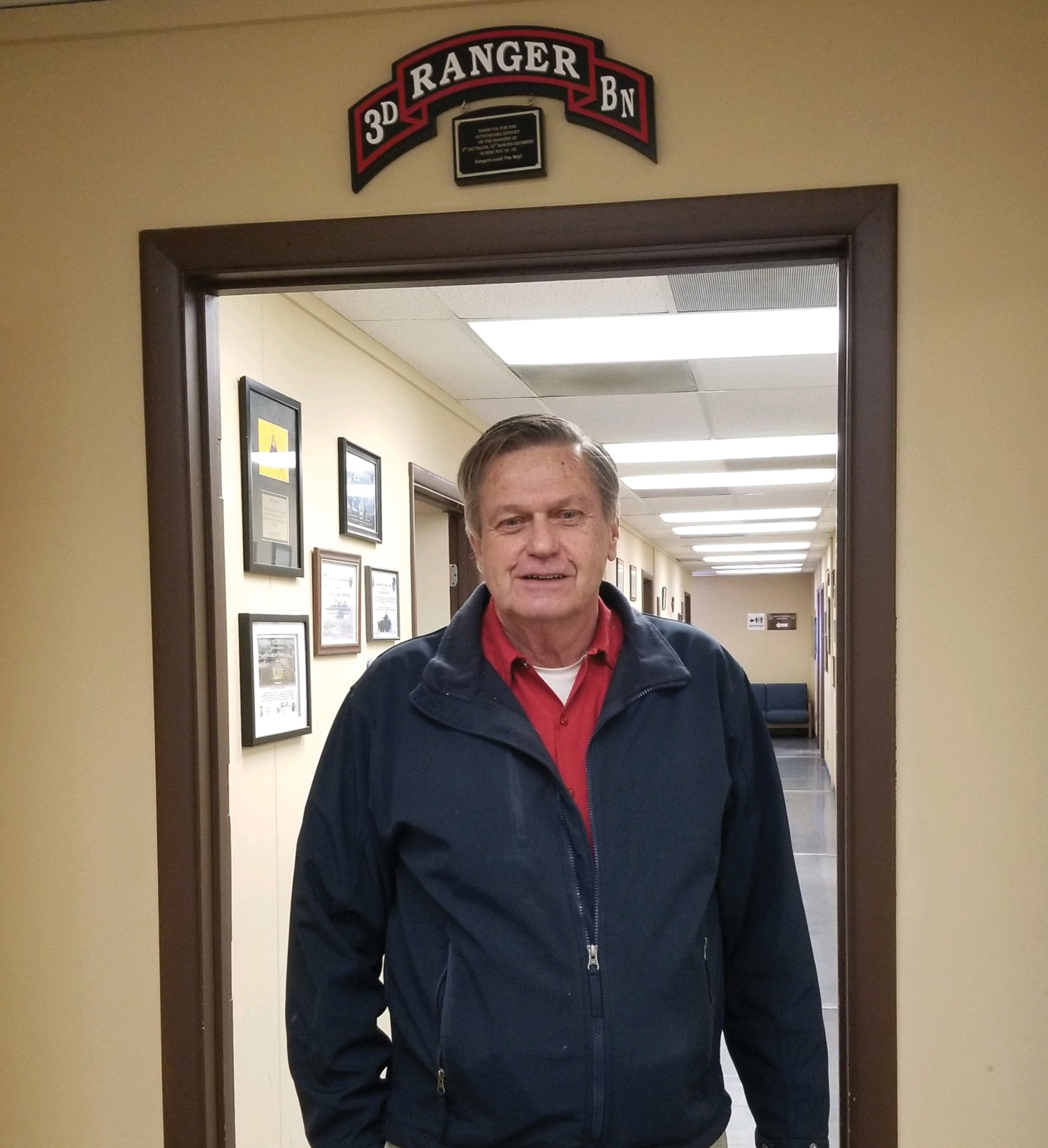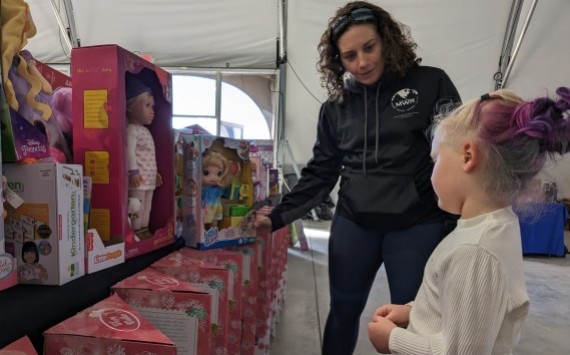FORT IRWIN, Calif. — When George Peck first came to Fort Irwin, it wasn’t even called “Fort Irwin,” and “The National Training Center” wasn’t heard of yet.
“They called it Camp Irwin but it was just a little base.” Peck said. “All the troop housing was all temporary because they didn’t have full-time units stationed out here.”
Peck, 65, first came to “Camp” Irwin in 1978 when he joined the National Guard’s 1/185 Armored Battalion, 40th Infantry Division. Now, 42 years later, he’s finally leaving.
“I got a job out here in 1984, and that was back in, I believe it was, the DynCorp days, base contractor, and they had some openings out here for some off-hours, off-duty, supervisor personnel and I got a job with that.”
In 1986, Peck was transferred to the Ranges Operations department (referred to as Range Control back then) as a range scheduler. That’s where he worked for the next 36 years, barring three years in the Installation Post Safety Office from 1990-1993.
On Dec. 30, 2020, Peck officially retired from his position in Range Ops Safety.
Early Life
Peck was born in Iowa but his family moved to Southern California in 1962 after his dad graduated. Peck joined the Army in 1972, after graduating from Eisenhower High School in Rialto.
“I was originally stationed at Fort Hood, Texas, for two years, and then I was stationed at Fort Lewis, Washington, for two years until I got out,” he said.
He joined the National Guard in 1978 in Southern California and retired from the Guard in 2001.
Biggest Changes he’s seen at NTC
When asked about the most significant differences between when he first came to NTC versus now, Peck said, “Pretty much everything has changed, I’d guess.”
He said the base he described as a “little base” 40-plus years ago, has expanded and had everything rebuilt.
“I think my biggest memory looking back now is that first 10 years working out here with the Range Ops and the Safety,” Peck said. “That’s when they were figuring out how to do things out here and they were expanding and building and putting infrastructure.”
He said the Rotational Units Bivouac Area (RUBA) had no buildings at first—just pop-up tent cities with no over-cover shades.
Peck was also a part of the transition into the digital age.
“Back in the old days, I guess maybe the biggest thing is, technically I started out here when the Army and everybody was still in the analog era,” Peck said. “This was before digital and computers and everything else.”
When Peck began working as a scheduler in the 1980’s, he said there were no computers. They had typewriters, mini fax machines and sometimes made copies off of mini graphics machines.
“And all correspondence around the installation between the organizations, you used what they called routing envelopes,” Peck said. “If you want to send something over to the post headquarters or a unit or something, you’d stick the memo or form in the routing envelope, put the address and then somebody came around every day and picked up all the routing envelopes, then they’d take ‘em and drop them off at the other organization, that was your ‘email.’”
Peck said the 30-plus years of change happened gradually.
“Of course, everything happens slowly, you don’t notice a whole lot of change all at once but step-by-step-by-step, then we got the first sets of computers,” Peck said.
Peck also talked about the first target-practice equipment at NTC in the 1980s.
“When I started working here, the only tank gunnery range we had was up in the middle of the installation and we were still using a vehicle that had been mounted on railroad wheels and it pulled a target around a railroad track,” Peck said. “That was the moving target for tank gunnery back in those days.”
Today, everything is digital and electronic and run from the tower.
“Yea, back in the old days, we didn’t even have uniforms at first in Range Operations,” Peck said. “Everybody was running around in T-shirts and cowboy hats mostly down range.”
Peck said he never really noticed all the changes over the years at first, “But then one day you stop and look back and you go ‘wow, all of this is different.’”
Why stay for three decades?
In a world where Americans spend an average of only five years in one job (thebalancecareers.com), remaining at the same occupation for nearly 40 years is unheard of but Peck said he loved what he did.
“I found a job that I liked and I was interested in,” he said. “I liked the variety of things— you’re never doing the same thing week after week when you work for Range Operations, that’s for sure. You just have Soldiers continuously coming in here and you take it and get them a plan and work through their issues and then you get them organized and scheduled and set something up and then you’ve kind of got a start-to-finish feeling to a lot of the projects you work on here.”
Peck said the feeling of accomplishment never gets old.
“Working with Soldiers, I’ve always liked that,” he said. “Trying to give them training, so they can improve their skills as they move up through the ranks, also, you get a sense of satisfaction out of that.”
What’s Next
Peck started his life, living with his mother and father and when he retires, he’s fortunate to have his mother’s home to return to live.
“I’m moving back to Oklahoma,” he said. “I’m going to live with my mother, she’s 88 years old now.”
Pecks mother lives alone in Edmond, Oklahoma, in the same town as Peck’s sister.
Peck also has a 30-year-old son who lives in Lawton, Oklahoma, and a 32-year-old daughter who is married to a Coast Guard officer with relatives living in Oklahoma.
Misses and Not-so-much misses
When it comes to Southern California, Peck, who lives in Barstow, said, “I like the weather out here, I don’t have to shovel snow, I hate snow.”
Although he’ll miss the sun, shores and sand, there’s one thing he’s happy to leave behind.
“What I won’t miss is the drive,” he said. “I’ve got about a 40-minute drive. I’m pretty well tired of the scenery. It has literally not changed in 30 years between Barstow and Fort Irwin.”
Overall, Peck said his experiences and time spent at NTC and Fort Irwin have all been memorable.
“I’ve enjoyed the work, I’ve enjoyed the people out here,” he said. “Not too many people I started working with are still out here, of course, but there’s a few people here.”
Peck said through it all, he remained steady on the Army’s goals.
“We’re all focused on accomplishing the mission and supporting the soldiers,” he said. “That’s one thing that hasn’t changed and I enjoyed working with the soldiers, even the new guys who don’t even know what a typewriter is, but that’s fine.”












